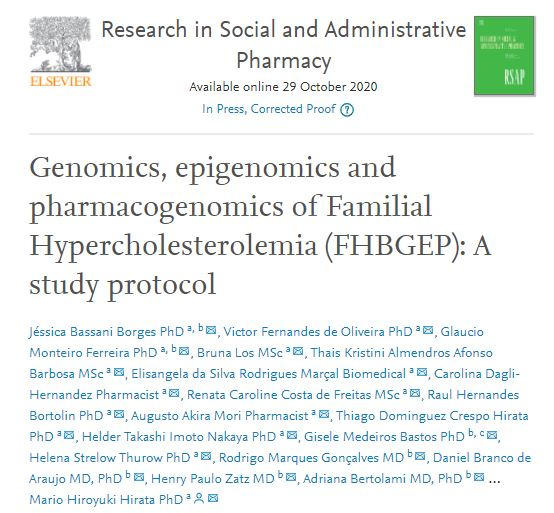Genomics, epigenomics and pharmacogenomics of Familial Hypercholesterolemia (FHBGEP): A study protocol.
Familial hypercholesterolemia (FH) is a genetic disease that affects millions of people worldwide. The study protocol FHBGEP was design to investigate the main genomic, epigenomic, and pharmacogenomic factors associated with FH and polygenic hypercholesterolemia (PH). FH patients will be enrolled at six research centers in Brazil. An exon-targeted gene strategy will be used to sequence a panel of 84 genes related to FH, PH, pharmacogenomics and coronary artery disease. Variants in coding and regulatory regions will be identified using a proposed variant discovery pipeline and classified according to the American College Medical Genetics guidelines. Functional effects of variants in FH-related genes will be investigated by in vitro studies using lymphocytes and cell lines (HepG2, HUVEC and HEK293FT), CRISPR/Cas9 mutagenesis, luciferase reporter assay and other technologies. Functional studies in silico, such as molecular docking, molecular dynamics, and conformational analysis, will be used to explore the impact of novel variants on protein structure and function. DNA methylation profile and differential expression of circulating non-coding RNAs (miRNAs and lncRNAs) will be analyzed in FH patients and normolipidemic subjects (control group). The influence of genomic and epigenomic factors on metabolic and inflammatory status will be analyzed in FH patients. Pharmacogenomic studies will be conducted to investigate the influence of genomic and epigenomic factors on response to statins in FH patients. The FHBGEP protocol has the potential to elucidate the genetic basis and molecular mechanisms involved in the pathophysiology of FH and PH, particularly in the Brazilian population. This pioneering approach includes genomic, epigenomic and functional studies, which results will contribute to the improvement of the diagnosis, prognosis and personalized therapy of FH patients.
Authors
Jéssica Bassani Borges; Victor Fernandes de Oliveira; Glaucio Monteiro Ferreira; Bruna Los; Thais Kristini Almendros Afonso Barbosa; Elisangela da Silva Rodrigues Marçal; Carolina Dagli-Hernandez; Renata Caroline Costa de Freitas; Raul Hernandes Bortolin; Augusto Akira Mori; Thiago Dominguez Crespo Hirata; Helder Takashi Imoto Nakaya; Gisele Medeiros Bastos; Helena Strelow Thurow; Rodrigo Marques Gonçalves; Daniel Branco de Araujo; Henry Paulo Zatz; Adriana Bertolami; André Arpad Faludi; Marcelo Chiara Bertolami; Amanda Guerra de Moraes Rego Sousa; João Ítalo Dias França; Cinthia Elim Jannes; Alexandre da Costa Pereira; Marcelo Arruda Nakazone; Dorotéia Rossi Silva Souza; Tayanne Silva Carmo; Marcelo Ferraz Sampaio; Renata Gorjão; Tania Cristina Pithon-Curi; Patricia Moriel; Vivian Nogueira Silbiger; André Ducati Luchessi; Jéssica Nayara Góes de Araújo; Michel Satya Naslavsky; Jaqueline Yu Ting Wang; Thales Kronenberger; Alvaro Cerda; Hui Tzu Lin-Wang; Adriana Regina Garofalo; Cristina Moreno Fajardo; Rosario Dominguez Crespo Hirata; Mario Hiroyuki Hirata
External link
Publication Year
Publication Journal
Associeted Project
Integrative Biology
Lista de serviços
-
StructRNAfinder: an automated pipeline and web server for RNA families prediction.StructRNAfinder: an automated pipeline and web server for RNA families prediction.
-
CEMiTool: a Bioconductor package for performing comprehensive modular co-expression analyses.CEMiTool: a Bioconductor package for performing comprehensive modular co-expression analyses.
-
webCEMiTool: Co-expression Modular Analysis Made Easy.webCEMiTool: Co-expression Modular Analysis Made Easy.
-
Assessing the Impact of Sample Heterogeneity on Transcriptome Analysis of Human Diseases Using MDP Webtool.Assessing the Impact of Sample Heterogeneity on Transcriptome Analysis of Human Diseases Using MDP Webtool.
-
Predicting RNA Families in Nucleotide Sequences Using StructRNAfinder.Predicting RNA Families in Nucleotide Sequences Using StructRNAfinder.
-
OUTBREAK: a user-friendly georeferencing online tool for disease surveillance.OUTBREAK: a user-friendly georeferencing online tool for disease surveillance.
-
Noninvasive prenatal paternity determination using microhaplotypes: a pilot study.Noninvasive prenatal paternity determination using microhaplotypes: a pilot study.
-
Editorial: User-Friendly Tools Applied to Genetics or Systems Biology.Editorial: User-Friendly Tools Applied to Genetics or Systems Biology.
-
Automatic detection of the parasite Trypanosoma cruzi in blood smears using a machine learning approach applied to mobile phone imagesAutomatic detection of the parasite Trypanosoma cruzi in blood smears using a machine learning approach applied to mobile phone images
-
Tucuxi-BLAST: Enabling fast and accurate record linkage of large-scale health-related administrative databases through a DNA-encoded approachTucuxi-BLAST: Enabling fast and accurate record linkage of large-scale health-related administrative databases through a DNA-encoded approach
-
Ten quick tips for harnessing the power of ChatGPT in computational biologyTen quick tips for harnessing the power of ChatGPT in computational biology

